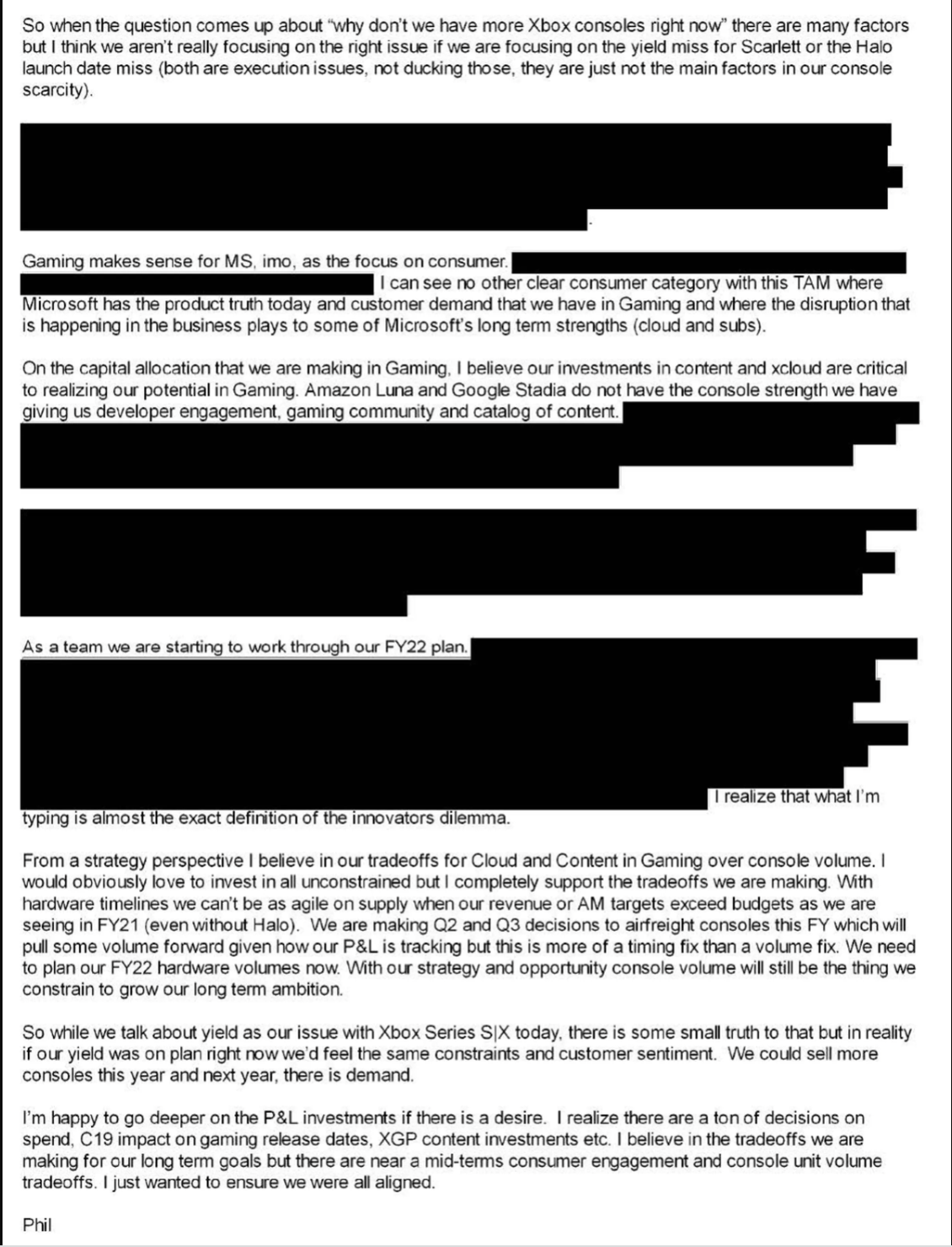Blog
Major Takeaways from Four Days of Testimony in the FTC Case Against Microsoft
Where there is smoke, there’s usually a fire… 10 things we learned from the trial to stop the $69 billion takeover of Activision Blizzard
Highlights
- The trial of the century kicked off on June 22 as FTC lawyers sought an injunction to stop the largest tech merger in history.
- Microsoft’s megamerger with Activision threatens the entire video game industry. Many comments from top executives at both companies showed that the merger is part of Microsoft’s long-term strategy to “create a moat that nobody else can attack.”
- As Lee Hepner with the American Economic Liberties Project pointed out on Twitter, “A LOT is riding on this case, and there are massive incentives to thwart confidence in the FTC's ability to do its job.“
Throughout the five days of testimony, one thing became very clear. Microsoft's mega merger with Activision threatens the entire video game industry.
Microsoft is motivated by their strategy to leverage this acquisition to dominate cloud gaming, secure a library of exclusive Activision titles for Xbox, and build a "moat that nobody else can attack." We can't let that happen.
As the Federal Trade Commission’s (FTC) case against Microsoft’s acquisition of Activision Blizzard wraps up, we’ll explore the bombshell evidence and testimony uncovered over five days in the courtroom.
- Microsoft and Activision continue to pressure Judge Jacqueline Scott Corley, threatening to abandon the deal if the FTC wins a preliminary injunction to stop the merger from closing on July 18.
- The FTC believes that Microsoft’s actions following its acquisition of ZeniMax and Bethesda are “powerful evidence” in favor of preventing the merger.
"Microsoft’s decision to make ZeniMax games exclusive is powerful evidence of incentive to foreclose. Microsoft’s actions following its 2021 acquisition of ZeniMax speak louder than the defendant's words. [...] Defendants put great stock in Microsoft’s concerns about “infuriating gamers” if it were to foreclose rival’s access to Activision content, but those same concerns did not stop the ZeniMax decision. One ZeniMax executive publicly apologized to the Xbox ecosystem, but the decision stands."
— Source: FTC Filing- Bethesda Senior VP of Global Marketing and Communication Pete Hines was perplexed by Microsoft's public comments at the time regarding keeping Call of Duty on PlayStation consoles going forward.
Bethesda exec was “confused” over double standard for multi-console Call of Duty
"I'm confused," Hines writes. "Is [this Call of Duty policy] not the opposite of what we were just asked (told) to do with our own titles? What's the difference?"
"I understand that there is likely nuance here, but at its core it's being read as the opposite of what happened with us," Hines said in a separate email to Microsoft Xbox Chief Phil Spencer the same day.
- Microsoft’s Xbox Game Studios chief, Matt Booty, was encouraging Xbox CFO Tim Stuart to spend big money on acquiring game content in 2019, saying in an email to “go spend Sony out of business.”
Xbox exec Matt Booty wanted to "spend Sony out of business"
"We (Microsoft) are in a very unique position to be able to go spend Sony out of business," Booty wrote, in reference to planned spending of spending $2-3bn in 2020 to avoid competitors getting ahead.
Booty went on to summarise the competition and state the need to avoid a "situation where Tencent, Google, Amazon or even Sony have become the Disney of games and own most of the valuable content. It is practically impossible for anyone to start a new video streaming service at scale at this point. In games, Google is three to four years away from being able to have a studio up and running. Amazon has shown no ability to execute on game content. Content is the one moat that we have, in terms of a catalogue that runs on current devices and capability to create new. Sony is really the only other player who could compete with Game Pass and we have a two year and 10m subs lead."
- Booty goes on to say in internal emails that the company’s goal is “create a moat that nobody else can attack. "Usually, moats like this are referred to in antitrust law as a monopoly.
- Microsoft sacrificed Xbox Series X sales for ‘long term ambition’ in the cloud, according to emails sent between Xbox chief Phil Spencer and Xbox CFO Tim Stuart in December 2020.

- Activision’s CEO Bobby Kotick—set to net a $500M bonus if this deal closes—admitted on the stand that Microsoft's strategy of putting games on a multi-game subscription “is value destructive,” but his responsibility is to shareholders.
- During the middle of the trial, Judge Corley denied Microsoft’s attempt to dismiss the video gamers suing to stop the merger.
- She also disclosed ahead of the trial a giant conflict of interest.
- Last but not least, internet bully and Activision’s Chief Communications Officer Lulu Meservey ridiculed FTC lawyers in a Slack to company employees.